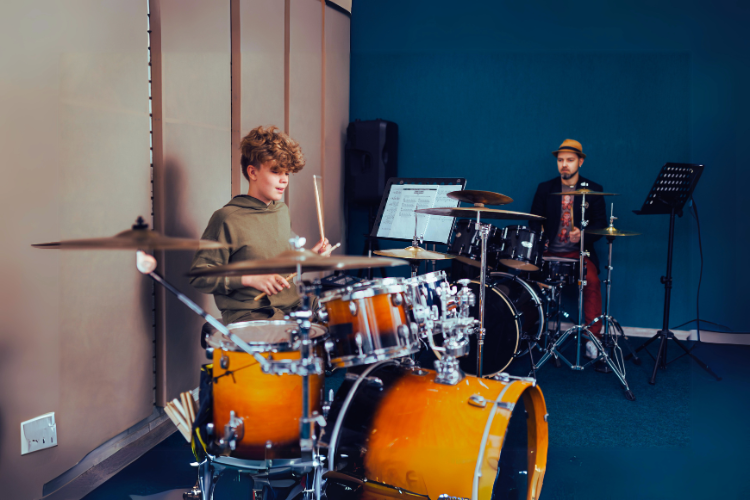While we live in an age with a wealth of information available at our fingertips, sometimes YouTube tutorials just don’t cut it. Especially when it comes to learning how to play an instrument, nothing beats having a personal tutor to show you the ropes.
A music teacher will communicate with you to understand your skill level, where you can improve, and what kind of approach you need to succeed. They can offer personal insight into the wonderful world of music and offer you helpful tips and advice you won’t always find online.
If you’re thinking about finally learning the instrument of your dreams, keep reading. We’ll explain what you should consider when hiring a music teacher.
Home Visits, Video Calls, or Music School?
There are three different ways you can go about attending lessons with your music teacher. Each has its pros and cons depending on your priorities and schedule.
Conveniently, some teachers will commute to your home if they live in the same area. This means you don’t have to worry about driving to a classroom every week or dropping your kid off for lessons.
This can also help ease younger students into forming a bond with their new teacher, as they’ll already be in a familiar and safe environment. However, for some students, home visits can be anxiety-inducing if it means they have to scramble to tidy up and prepare their space beforehand.
Video calls are another great way to attend classes. They also broaden your horizons for hiring an expert that may live too far to visit in person. Your teacher will still be able to hear and see everything you’re doing. However, depending on the sound quality of your devices, they may not be able to get an accurate grasp of the sound you’re producing.
Lastly, if you don’t mind the drive, you can research whether there are any music schools in your area. Teachers hired by the school will be proven experts with their instrument(s) of choice and are likely to be taking new students. Music schools often have instruments for free use, rent, or sale as well.
Skill Level
You’ll want to consider whether you’re a true beginner or you’ve mastered the basics and are ready to move on to more challenging lessons.
Some teachers specialize in teaching the foundations, like the proper ways to hold your instrument or reading music and tablature, while others can work with what you already know to help you soar to new heights. Many can be there for you from beginner to maestro.
Another important thing to consider is whether you need someone who is used to teaching adults or children, which requires different approaches and communication styles. In general, make sure your music teacher understands what level you are operating on so they can meet your needs best.
Teaching Styles
What is your purpose for learning music?
If you’re hoping to one day master your instrument to the point of pursuing a professional career as a musician, you’re going to need someone who has the experience to mentor you. You’ll likely need a teacher who is serious about pushing you to succeed and makes sure you are keeping up with practicing. You may even need more frequent lessons.
However, if you’re just learning a new instrument for fun, you’re not going to enjoy having a music teacher who is far too serious or strict about your lessons. You may benefit from a facilitator—someone who is more easygoing and gives you all the tools to succeed while letting you decide whether to use them.
If you’re looking into hiring a teacher for your child, try and find someone who will make lessons fun to attend, encourage your kid’s gifts, and share their love of music. You don’t want to start a child off with someone strict or monotone—that’s the number one way to kill their passion.
Whatever the case, make sure you find someone with the right teaching style who is willing to go at your pace. We recommend scheduling a meet and greet to assess whether they’re a good match.
Learning Styles
How do you learn best? Learning styles include auditory, visual, kinesthetic, and reading/writing styles:
- Visual learners learn best through images and videos or by watching someone else demonstrate an example of the lesson they’re learning.
- Auditory learners grasp concepts best through lectures or by spoken instruction (if you have perfect pitch, you may even be able to hear someone play the notes and replicate them to learn).
- Kinesthetic learners understand lessons by doing things themselves and working through trial and error.
- Reading/writing learners absorb information better when it is written in front of them or when they can take notes for their review.
Whichever way you learn best, you’ll want to communicate that to your music teacher and find someone who can accommodate you with a similar teaching style. Again, we recommend scheduling a meet and greet to assess whether they’re a good match.
Good Reviews
The easiest way to tell if a music teacher really has the skills to teach you properly is by looking up their reviews. Some private or freelance music teachers have their own websites where you can see what previous students have to say about them.
While this isn’t a guarantee of their adequacy, as reviews can be faked or curated, it’s a great place to start. Look for people who have the same priorities as you do for the best understanding of whether the teacher would be a good fit for you.
Scheduling
After you do your research and narrow down your candidates, it’s important to reach out to them and ask after their availability. We’re sure you have a busy life, and music teachers will have to work around other students they already have to juggle.
Even if you have a great teacher, sometimes it’s not worth the hassle of restructuring your entire routine just to make lessons. However, it may be worth doing so for lessons that only occur biweekly, or once a month.
That’s up to you and your priorities, but always work out what you’re willing and able to do before you communicate with your new music teacher to avoid complications.
We hope this article has been informative and wish you the best of luck finding a fantastic music teacher. Congrats on taking the first step toward becoming a maestro!
Connect with local music teachers in your area.



